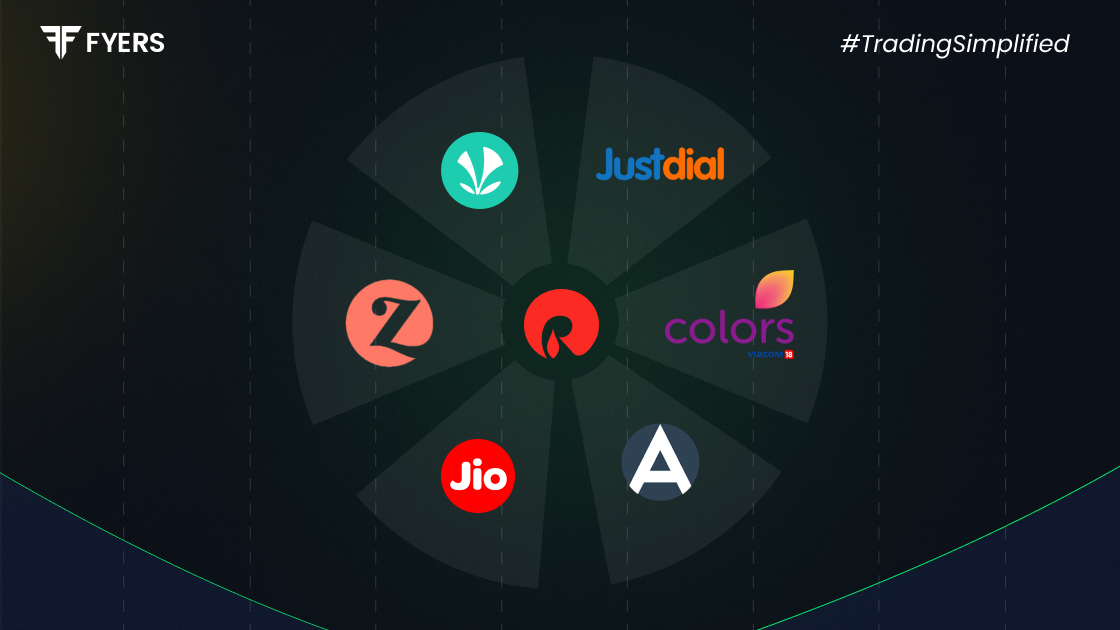

 27 Mar, 2025
27 Mar, 2025
 4 mins read
4 mins read

Reliance Industries is a story of growth, ambition, and change. Starting as a small textile business in the 1960s, it has become one of India's biggest companies, shaping industries like energy, retail, and telecom. Its journey reflects India's economic progress, driven by innovation and bold decisions. Let’s go through the history of Reliance Industries through this blog.
Imagine a company that started as a small trading firm and grew into a global powerhouse. That's the story of Reliance Industries Limited (RIL). Founded by Dhirubhai Ambani, this company has transformed from a modest business into a massive conglomerate. You'll be amazed by how RIL has become a leader in petrochemicals, telecommunications, retail, and energy.
Dhirubhai Ambani's journey began in 1958 with Reliance Commercial Corporation. What started as a small trading business focused on exporting spices and importing polyester yarn soon became something much bigger. By 1966, Dhirubhai had invested ₹28 lakh to enter the textile market. His vision was so powerful that within a decade, he built the largest textile firm in India.
In 1977, Reliance Industries became a public limited company. Its initial public offering (IPO) was groundbreaking, attracting thousands of small investors. This move laid the foundation for future growth. During the 1980s, the company expanded into petrochemicals and refining, cleverly using vertical integration to support its textile business.
After Dhirubhai's death in 2002, a dramatic family split occurred. His sons, Mukesh and Anil Ambani, divided the business empire in 2005. Their mother helped broker a demerger agreement that split their responsibilities. Mukesh retained control of oil refining, petrochemicals, and gas exploration. Anil took over financial services, power generation, and telecommunications.
The split showed two very different paths. Mukesh's Reliance Industries flourished with innovative ventures like Reliance Jio and Reliance Retail. In contrast, Anil's businesses struggled with mounting debt and declining profitability. Today, you'll find Mukesh Ambani's RIL as one of India's most valuable companies.
Reliance Industries operates through several key subsidiaries. Here’s a list of major subsidiaries of Reliance Industries along with their key focus areas:
Reliance Retail – India’s largest retailer, dealing in groceries, fashion, electronics, and more.
Jio Platforms – Parent company of Jio, focused on telecom, digital services, and tech innovation.
Reliance Jio Infocomm – Leading telecom provider in India, offering mobile and broadband services.
Reliance Petroleum – Engaged in refining and petrochemical operations.
Reliance New Energy Ltd. – Focuses on renewable energy, including solar, hydrogen, and battery tech.
Reliance Industrial Investments & Holdings Ltd. – Manages strategic investments and financial services.
Reliance Life Sciences – Specializes in biotechnology, pharmaceuticals, and healthcare solutions.
Reliance Foundation – Philanthropic arm working in education, healthcare, and rural development.
Network18 Media & Investments Ltd. – Reliance’s media and entertainment arm, owning news channels (CNN-News18, CNBC-TV18), digital platforms (Moneycontrol, Firstpost), and entertainment networks (Viacom18, Colors, JioCinema)
The growth of Reliance Industries is unparalleled in Indian corporate history.
Reliance Industries' journey began in 1966, when Dhirubhai Ambani founded Reliance Textiles, focusing on polyester production. By 1977, the company went public, marking its entry into the Indian stock market. The 1980s saw rapid expansion into petrochemicals, refining, and synthetic fibers, laying the foundation for its industrial empire.
In the 1990s, under Mukesh and Anil Ambani, Reliance diversified further, entering the telecom sector with Reliance Communications. The early 2000s witnessed the launch of Reliance Petroleum and Reliance Retail, making it a dominant force in energy and consumer markets. Following a family split in 2005, Mukesh Ambani retained Reliance Industries, steering it toward massive growth.
The game-changer came in 2016 with the launch of Reliance Jio, revolutionizing India’s telecom sector with affordable 4G services. In the 2020s, Reliance accelerated its digital and retail expansion, securing major global investments in Jio Platforms and Reliance Retail. It also set its sights on renewable energy, launching Reliance New Energy Ltd. to drive India’s green revolution.
From textiles to telecom and now clean energy, Reliance’s evolution reflects India’s economic transformation, making it one of the country’s most influential conglomerates.
Looking ahead, Reliance Industries seems poised for continued success. Mukesh Ambani has emphasised green energy projects like solar power and hydrogen fuel technology. These initiatives align with global sustainability goals. You can expect Reliance Jio to lead advancements in 5G technology and digital infrastructure.
Reliance Retail plans to integrate e-commerce platforms to enhance consumer experiences. Under Mukesh Ambani's leadership, the company remains focused on adapting to market changes. The emphasis on renewable energy and digital transformation ensures RIL stays at the forefront of global business trends.
Dhirubhai Ambani founded Reliance Industries in 1966, starting as a small textile trading company in Mumbai.
Reliance Industries operates in these major sectors:
The split occurred after their father Dhirubhai Ambani's death in 2002 due to the lack of a clear business division in his will. This led to significant family tensions and business disagreements. In 2005, the brothers divided the Reliance empire:
Reliance has contributed to India's economy through:
Calculate your Net P&L after deducting all the charges like Tax, Brokerage, etc.
Find your required margin.
Calculate the average price you paid for a stock and determine your total cost.
Estimate your investment growth. Calculate potential returns on one-time investments.
Forecast your investment returns. Understand potential growth with regular contributions.